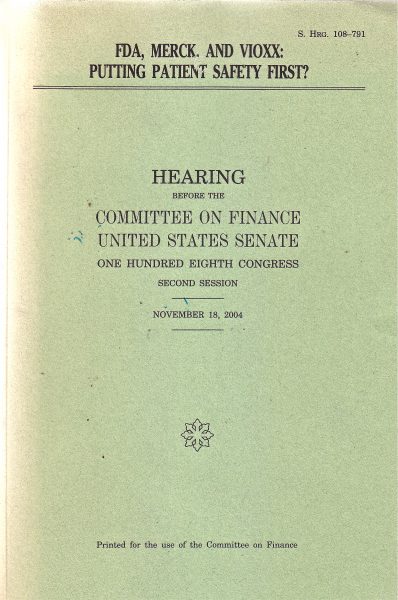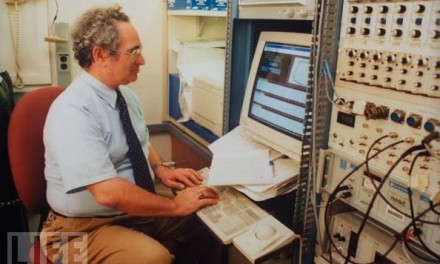By Fred Gardner in O’Shaughnessy’s, Spring 2005
Some 3,000 Americans died in the attack on the World Trade Center and the Pentagon September 11, 2001. More will die from exposure to toxins they breathed —heroes who put out the flames and searched for survivors and cleared out the toxic rubble.
Some 55,000 Americans have died from strokes and heart attacks brought on by Vioxx according to the best estimate of David Graham, MD, of the Food & Drug Administration. Many more have been disabled.
To put it bluntly: Merck killed about 18 times as many Americans with its pills than the 9/11 attackers did with their hijacked planes.
Why isn’t the President denouncing Merck, Inc., as a terrorist organization? Didn’t Merck kill many more American civilians than Al Qaeda? Why isn’t Ray Gilmartin, the head of Merck, being prosecuted? Why does the government continue to do business with Merck?
Some may argue that Merck’s bosses didn’t wreak death and destruction intentionally. But they did! An early clinical trial alerted Merck executives to the fact that Vioxx caused coronary damage. Their response was to exclude from future trials anyone with a history of heart trouble!
Once the drug was on the market, Merck intentionally suppressed indications that it was causing strokes and heart attacks at twice the normal rate, and they intentionally spent $8.5 million a month advertising it. “It’s a beautiful morning” lilted from every TV in the land as Merck pushed a drug that Gilmartin and the other top bosses knew would kill people.
In the end, 140,000 Americans who went for the Vioxx pitch wound up suffering heart attacks or strokes as a result. Because heart attacks and strokes are common causes of death and disability, those induced by Vioxx, in a nation of 280 million, did not present an immediate red flag. And because some 25 million people had taken or were taking the drug, the victims were isolated geographically, one collapsing here, one there, over three years —whereas the World Trade Center victims died together, in an instant, in a televised inferno.
Public outrage over the Vioxx deaths would have been fostered if the men who run the corporate state and media identified with the victims rather than with the perpetrators. Day after day, night after night we would have been bombarded with feature stories about the families that lost a dad at 39, a mom at 42. We would be hearing from stroke victims, paralyzed, slurring their words, telling how long they had been on Vioxx and why. (Two-thirds of the people who took it were lured by ads and could have made do with an easier-on-the-stomach painkiller.)
The President would have called for an investigation and the FBI would have seized all Merck’s records relating to the approval of Vioxx. They would have seized the financial records of every influential M.D. involved in its approval. Each detail of the conspiracy to market Vioxx would have been played as headline news. We would learn as much about rigged clinical trials as we did about Scott Peterson disposing of his poor wife’s body. The American people would know the name and face of Heartless Ray Gilmartin as well as we know Osama Bin Laden’s.
Instead, the Vioxx story was downplayed and still is being downplayed, given its enormity. We get fed a steady diet of junk news —distant psychopaths, kidnappers— instead of getting information and learning about events that directly affect us.
Today the Vioxx story is mainly covered as business news —the effect on Merck’s stock, how much money the impending lawsuits might cost the company, how much will be covered by insurance, etc. When the trials begin, Merck will undoubtedly challenge the honesty of the victims. Those who don’t have a valid claim (inevitably there will be some) will be publicized and ridiculed on Fox, with the rest of the corporate media snapping at their heels. TV viewers will get a sense that yes, some people died from taking Vioxx, but many others employed venal trial lawyers to “game the system…” The intentional murder of 55,000 innocent America by corporate conspirators will have been erased. Such is the power of television when controlled by (five other) corporate conspirators.
Merck announced a “voluntary recall” in late September (knowing full well that Graham had submitted his findings to the Lancet). Pfizer decided to keep its Cox 2 inhibitors, Celebrex and Bextra, on the market although Graham’s data suggested they also cause harm (only less frequently.)
An FDA advisory committee met February 17 to review safety data on Cox inhibitors. They voted 17-15 to allow Vioxx to remain on the market (with a black box warning). Two days later the New York Times reported that 10 of the 32 advisers had consulted in recent years for Merck, Pfizer and Novartis. If they had declared their conflicts of interest, the committee would have nixed Vioxx by 14-8 and Bextra by 12-8.
No one refuted Graham’s findings that Vioxx at high doses does more cardiovascular damage than smoking, diabetes, or high blood pressure. But its “unique benefits” were found to outweigh its adverse effects!
There would have been no need for Vioxx and the other Cox-2 inhibitors if the DEA allowed U.S. doctors to prescribe codeine readily —not to mention cannabis.
“Safety” was the rationale for developing Vioxx (and Celebrex, now made by Pfizer but developed by G.D. Searle, a Monsanto subsidiary). Aspirin and other non-steroidal inflammatories such as ibuprofen (Motrin, Advil) and naproxen (Aleve) are effective, but large doses can cause gastrointestinal bleeding and peptic ulcers in some people. (Tylenol isn’t anti-inflammatory at all. It reduces pain and fever while damaging the liver.) So the drug companies saw an “easier-on-the-stomach” marketing niche that, given the prevalence of arthritis and chronic pain —and the rationing of codeine and prohibition of cannabis— could prove lucrative.
As explained by Dr. Melamede in this issue, aspirin and the other NSAIDs work by inhibiting an enzyme called cyclooxygenase (Cox), that helps make compounds called prostaglandins that facilitate the inflammatory response and have other important functions, including protecting the stomach lining and maintaining kidney function. Because the NSAIDS inhibited Cox-1 more than Cox-2, and because Cox-2 was more prevalent in damaged tissues associated with arthritis, it was hoped that a drug that inhibited only Cox-2 production would reduce inflammation without gastric side effects. So, hundreds of millions were invested in research and development, and the Cox-2 inhibitors were pushed towards the market.
One of Merck’s early studies showed that patients on Vioxx suffered more heart attacks than patients on naproxen, but the company claimed, without evidence, that this was due to some protective effect of naproxen, and the FDA bought it. (Aspirin reduces heart attacks; naproxen doesn’t.) People with heart problems were excluded from subsequent clinical trials of Vioxx. The goal of the large-scale study that revealed a 200% increase in heart attacks and strokes was to show that Vioxx reduced polyps in the colon! Merck was looking for an additional marketing niche, not trying to answer ominous questions about the safety profile of its #3 bestseller.
According to Marcia Angell, MD, former editor of the New England Journal of Medicine, “It is likely that many more people had heart attacks and strokes from Vioxx than were saved from bleeding ulcers, given the high prevalence of heart disease in the population that uses Vioxx and the deliberate exclusion of those people in the trial… Cox 2 inhibitors like Vioxx are no better than over-the-counter drugs for relieving arthritis symptoms (they do not enable you to skate like Dorothy Hamill), far more expensive and of only limited effectiveness in preventing gastrointestinal complications.”
And yet it may up to Merck whether or not to market it again!
David Graham, the doctor who blew the whistle on Vioxx, also warned the Senate Finance Committee on 11/19 about five drugs he thought should be pulled off the market or severely restricted. Graham’s warning was reported by Marc Kaufman of the Washington Post (and almost no one else): “AstraZeneca’s Crestor poses risks of kidney failure and a rare muscle disease; Abbott Laboratories’ Meridia is of little use and has cardiovascular side effects; Roche’s Accutane can cause birth defects if used by pregnant women; Pfizer’s Bextra carries cardiovascular risks similar to those linked to Vioxx; and GlaxoSmithKline’s Serevent increases the risk of dying of asthma.”
Dr. David Graham is an epidemiologist whose research is straightforward. He and his colleagues conducted their Vioxx study by reviewing the files of 1.4 milion California Kaiser Permanente members age 18-84 over a three-year period, 1999-2001, and comparing the rates at which those who took various non-steroidal anti-inflammatories suffered heart attacks and sudden cardiac deaths. Higher-ups at the FDA pressured him not to report his findings about Vioxx. “I didn’t set out to be a whistleblower,” he says. “The FDA made me a whistleblower.”
Graham appeared before the FDA advisory committee that met Feb. 17 and reiterated his warnings in vain. He questioned the evidence that Cox 2 inhibitors cause fewer ulcers than the older NSAIDS. Some 40 percent of those who suffered Vioxx-induced heart attacks died, he said, compared to 5 percent of those who suffer NSAID-induced ulcers. He threw in a warning about Indocin (endomethacin), which nearly doubled the risks of heart attacks in a study he had conducted, and Mobic, which increases the risk of heart attack and stroke by 37 percent, Dr. Graham’s study showed. According to the New York Times, “Several panel members expressed skepticism because the findings were derived from observational studies, which are not completely trustworthy.”
Unlike the randomized, placebo-controlled, double-blinded study, the “gold-standard” of corporate-state science.
PS in the New York Times Business Section, November 22, 2011
Merck to pay $950 Million Over Vioxx
By Duff Wilson
Merck has agreed to pay $950 million and has pleaded guilty to a criminal charge over the marketing and sales of the painkiller Vioxx, the company and the Justice Department said Tuesday.”
The negotiated settlement, which includes resolution of civil cases, was the latest of a series of fraud cases brought by federal and state prosecutors against major pharmaceutical companies.
By the time Vioxx, which was approved by the Food and Drug Administration in 1999, was pulled off the market in 2004 because evidence showed that it posed a substantial heart risk, about 25 million Americans had taken the drug.
In a statement on Tuesday, Merck said that it had previously disclosed the seven-year investigation by the United States attorney in Massachusetts and had charged $950 million against its earnings in October 2010.
Merck agreed to pay a $321 million criminal fine and plead guilty to one misdemeanor count of illegally introducing a drug into interstate commerce, the Justice Department said in a news release. The charge arose from Merck’s promotion of Vioxx to treat rheumatoid arthritisbefore the Food and Drug Administration approved it for that purpose in 2002.
Merck also is paying $426 million to the federal government and $202 million to state Medicaidagencies. Those payments will settle civil claims that its illegal marketing caused doctors to prescribe and bill the government for Vioxx they otherwise would not have prescribed.
Physicians are free to prescribe drugs for any purpose they see fit, but pharmaceutical companies are prohibited from marketing them for any uses except those that the Food and Drug Administration has determined are safe and beneficial.
“When a pharmaceutical company ignores F.D.A. rules aimed at keeping our medicines safe and effective, that company undermines the ability of health care providers to make the best medical decisions on behalf of their patients,” Tony West, assistant attorney general of the Justice Department’s civil division, said in a statement.
Merck, based in Whitehouse Station, N.J., withdrew Vioxx from the market in more than 80 countries in 2004 after a clinical trial showed it doubled the risk of heart attack, stroke and death.
In 2007, Merck agreed to pay $4.85 billion to settle 27,000 lawsuits by people who had claimed they or their relatives had suffered injury or death after taking the drug. Merck has also signed a corporate integrity agreement in connection with the settlement, promising to monitor future promotional activity and report back regularly to the government. Merck joins Pfizer and most other major drug companies in settling long investigations with prosecutors.
No person was held liable for Merck’s conduct. “It’s just a cost of doing business until a pharmaceutical executive does a perp walk,” said Erik Gordon, a pharmaceutical analyst and clinical assistant professor at the Ross School of Business at the University of Michigan.
Investors are also suing Merck, saying it played down the risks of Vioxx and cost them billions of dollars in stock value after the drug was removed from the market.
Merck shares declined most of the day on Tuesday, dropping 0.97 percent to $33.81.




